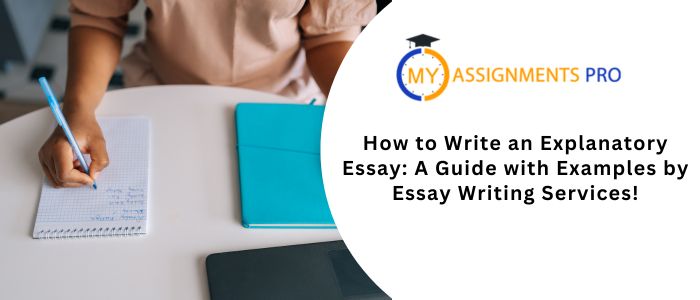
How to Write an Explanatory Essay: A Guide with Examples by Essay Writing Services!
Explanatory essays are vital in academic and professional writing since they enable the reader to understand complex concepts, procedures, or ideas. Such writings offer a clear presentation of facts to help readers understand the subject and focus on educating and elucidating without prejudice. An excellent explanation essay can clarify difficult subjects and make them understandable to a wider audience, whether you are discussing social concerns, scientific occurrences, or historical events. An excellent explanation essay needs a proper selection of topics, deep research, and logical information arrangement. All such steps could be discussed on this blog as the posting progresses with successful tips and techniques toward forming an understandable, coherent essay. Professional essay writing services like My Assignments Pro are also accessible if you need further help to polish your work and ensure your essay is compelling, correct, and well-written. Explore this article to discover how to write explanatory essays like a pro!
What Is an Explanatory Essay?
Writing that seeks to elucidate or clarify a topic, procedure, event, or idea is known as an explanation essay. For the reader to understand this kind of essay, the writer must objectively offer facts and information. Instead of offering subjective viewpoints or arguments, the emphasis is still on educating and elucidating. As per essay writing services, a well-written explanation essay provides readers with fair, fact-based information so they may learn about the subject without prejudice.
Key Steps to Writing an Explanatory Essay: Hear From Essay Assignment Help!
Writing an explanation essay calls for thorough preparation, well-structured writing, and in-depth subject knowledge. Here is a detailed approach by essay writing services to assist you in creating an organized explanation essay:
Choose a Clear Topic
Choose a topic that can be supported by facts and examples to begin with. To assist keep the essay focused, pick a topic that interests you and isn't too general or specific.
Conduct Thorough Research
Collect data from reliable sources, including books, scholarly publications, and trustworthy websites. The credibility of your essay will be increased if you take notes on the important elements and instances that back up your reasoning.
Develop a Strong Thesis Statement
Your essay's major idea should be summed up in a concise thesis statement. The thesis statement directs the course of your explanation and sets the stage for readers to follow, even if an explanatory essay isn't an argumentative piece. Additionally, our “write my essay” services are always available for students to assist them whenever they need any kind of assistance.
Create an Outline
Put your thoughts and research into a logical order. An introduction, body paragraphs that each concentrate on a different topic, and a conclusion are typical components of explanatory essays. Using an outline helps you stay organized and makes sure that whatever you write makes sense.
Write the Introduction
Start with a captivating hook to pique readers' interest, then provide background details about the subject. To establish the scene for your explanation, conclude the introduction with your thesis statement.
Craft Informative Body Paragraphs
One concept about your thesis should be included in each paragraph. Introduce the point with a subject phrase, then support it with examples and proof. Finish each paragraph with a statement that flows naturally into the one after it. Our essay assignment help services also conduct guided sessions for students to provide them with a better understanding of the subject matter.
Conclude with a Strong Summary
Finish your essay by restating the key ideas without adding any additional details. Emphasize the significance or relevance of your argument and provide the reader with one last reflection on the subject.
Edit and Proofread
Check your essay for spelling, grammar, and clarity. Make sure all of the information is correct and that your thoughts make sense. Editing makes your essay more polished and effective while also improving readability and professionalism.
Example Structure for an Explanatory Essay by Essay Assignment Help!
A well-structured explanation essay makes it easier for readers to follow your arguments and comprehend your analysis. This is a thorough explanation of a typical explanatory essay format:
Introduction
- Start with an attention-grabbing remark or query to draw the reader in. This might be a thought-provoking inquiry on the subject, an intriguing fact, or a pertinent quotation.
- Give a brief overview of the topic's background. To aid the reader in understanding the topic, this may contain definitions or pertinent information.
- According to “write my essay” services, provide a succinct thesis statement summarizing the essay's primary goal or topic after the introduction. This statement serves as the essay's compass and foreshadows the main ideas you will discuss.
Body Paragraphs
- One major point pertaining to the subject should be included in each body paragraph. It is simpler to follow the explanation in this style as the reader can concentrate on one concept at a time.
- Each paragraph should begin with a distinct subject sentence that presents the section's central concept. The subject phrase links the paragraph's content to the thesis and establishes expectations for it.
- Give instances or proof to back up your claims after the topic phrase. Data, quotes, facts, and logical reasoning can all be included in this. Give a succinct explanation of each piece of evidence, highlighting its relevance to the subject. You can also opt for essay assignment help to get instant assistance with your assignment writing.
- Analyzing the data in an explanation essay makes it clearer how it bolsters the main thesis. Talk about how the knowledge clarifies a key point or advances our comprehension of the subject.
- Use a phrase that sums up the major idea of each paragraph and gets the reader ready for the following one. The article flows easily when the paragraphs transition smoothly.
Counterargument or Additional Insight (Optional)
- In certain instances, responding to a counterargument or providing further information might deepen the essay. You might add a paragraph that offers more context or examines another viewpoint.
- If applicable, acknowledge any contrasting viewpoints or thoughts on the subject. This shows a deep comprehension and gives the writing more balance.
- If you're responding to a counterargument, simply describe how it doesn't change your primary point. If not, connect the new information to your primary ideas. Our “write my essay” services also conduct regular live sessions for students to clarify their doubts and queries regarding the assignment.
Conclusion
Rephrase the thesis statement to start the conclusion, reiterating the essay's main goal.
Summarize the key points covered in the body paragraphs. The conclusion should restate what has previously been discussed, therefore don't add anything new here.
Finish with a compelling last line that highlights the topic's importance or provides a last thought. This last idea confirms the essay's core point and gives the reader something to think about.
Common Mistakes to Avoid in Explanatory Essays: Learn From Essay Assignment Help!
It might be difficult to balance depth and clarity while writing an explanation essay. Avoiding frequent errors that might lower the caliber of your writing is crucial to ensuring that your essay communicates successfully. The following are common dangers and ways to avoid them:
Lack of a Clear Thesis Statement
Its essay's main topic is provided by its thesis statement. Without a well-defined thesis, readers could struggle to comprehend the essay's primary goal. Create a succinct thesis statement that highlights the essential ideas and arguments of your essay to avoid this. This statement acts as a roadmap, letting readers know what to anticipate and maintaining the focus of your work.
Providing Opinions Instead of Facts
An explanation essay aims to enlighten rather than to convince and is objective. Subjective or personal comments might mislead readers and take the focus away from the essay's main objective. Avoid this by putting more emphasis on facts, analysis, and supporting data than on subjective opinions. Make sure your explanations are well-founded and educational by using reliable sources and research to back up each claim. You can also get assistance from “write my essay” services and get direct access to exceptional experts for better assignment writing.
Insufficient Supporting Evidence
In an explanation essay, every argument should be supported with evidence. A typical error is to make arguments weak and unpersuasive by omitting important examples, figures, or references. To bolster your argument and give readers a better grasp of the subject, try to provide pertinent proof for each of your major points.
Overloading the Essay with Information
Although depth is crucial, readers may find it difficult to comprehend an overly detailed essay. Make clarity your priority by choosing the most pertinent data for every area. By doing this, you may keep your essay free of superfluous information and make it easier for readers to remember the main ideas.
Weak Transitions Between Paragraphs
According to essay assignment help, when writing explanatory essays, coherence is essential. Your article may seem fragmented and hard to read if there aren't any seamless transitions. To properly link concepts between paragraphs, utilize transitional words rather than leaping straight from one thought to the next. This method guarantees that your points flow naturally and improves readability.
Failure to Address Counterpoints
Ignoring opposing viewpoints or arguments can erode your analysis and give the impression that it is biased. If counterarguments are pertinent, quickly addressing them demonstrates that you have thought through other viewpoints, which deepens your insight. Explain why these issues don't affect your main thesis or acknowledge them without compromising it.
Weak Conclusion
A solid ending is crucial for reiterating your major arguments and making an impact, yet many authors undervalue its significance. Don't just reiterate the introduction. To give the reader a sense of closure and comprehension of the subject, instead, freshly repeat the thesis, summarize the key arguments, and conclude with a last thought. Our experts at essay assignment help also provide tutoring sessions that help students write better assignments and get better grades.
Poor Proofreading and Editing
Spelling, grammar, and poor wording can divert readers and damage the trustworthiness of your essay. Always make extensive revisions to your article before submitting it. Proofreading improves the overall caliber and professionalism of your work by ensuring that your writing is clear, flawless, and easy to read.
In conclusion, writing an explanatory essay is a valuable skill that enhances your ability to communicate complex ideas clearly and effectively. By understanding the key components, following a structured approach, and avoiding common pitfalls, you can create essays that engage and inform your readers. Resources such as online writing centers, educational websites, library materials, and professional writing services like My Assignments Pro can provide invaluable support throughout your writing process. Whether you need sample essays or guidance on crafting your own, these tools can help elevate your writing. Embrace the challenge of explanatory essay writing, and leverage the available resources to express your ideas confidently and persuasively. Remember, practice makes perfect, so take the time to refine your skills and create essays that resonate with your audience.



